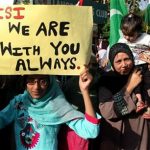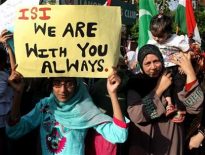President Obama announced Monday that the United States is levying a new round of sanctions against Russia in response to that country’s actions in Ukraine, striking against individuals and companies close to Russian President Vladimir Putin.
Seven Russian government officials, including two members of Putin’s inner circle, will be subject to an asset freeze and a U.S. visa ban, and 17 companies linked to Putin’s inner circle will be subject to an asset freeze, according to a statement by White House press secretary Jay Carney.
The goal here is not to go after Mr. Putin personally, Obama said in Manila on Monday during a new conference. The goal is to change his calculus with respect to how the current actions that he’s engaging in could have an adverse impact on the Russian economy over the long haul.
Igor Sechin, the president of the state-owned oil company Rosneft, and Sergei Chemezov, the head of the state-owned energy giant Gazprom, are among those with the highest profile being hit by the new sanctions, according to the Treasury Department. Other individuals hit by the sanctions include Oleg Belavantsev, Russia’s presidential envoy to Crimea; Dmitry Kozak, a deputy prime minister of the Russian Federation; Evgeniy Murov, director of Russia’s Federal Protective Service; Aleksei Pushkov, deputy of the state Duma; and Vyacheslav Volodin, first deputy chief of staff to Putin.
The White House said it expects the European Union to announce its own new sanctions against Russia later Monday.
MORE: Eastern Ukraine mayor shot
The Department of Commerce is imposing additional restrictions on 13 of those companies by issuing a license requirement with a presumption of denial for the export, re-export or other foreign transfer of U.S.-origin items to the companies. Commerce and the State Department also announced a tightened policy to deny export license applications for any high-technology items that could contribute to Russia’s military capabilities. Those departments also will revoke any existing export licenses that meet these conditions.
Among the entities being hit by the new licensing restrictions are Stroytransgaz Holding, located in Cyprus; Volga Group, located in Luxembourg and Russia; and Aquanika, Avia Group LLC, Avia Group Nord LLC, CJSC Zest, Sakhatrans LLC, Stroygazmontazh, Stroytransgaz Group, Stroytransgaz LLC, Stroytransgaz-M LLC, Stroytransgaz OJSC, and Transoil, all located in Russia.
Anders Aslund, a senior fellow at the Peterson Institute of International Economics in Washington, said sanctioning 17 influential companies sounds like quite a lot to me.
Sanctions should be focused on a small group that has Putin’s ear and participates in his government’s corruption racket, rather than on the majority who are victims of the smaller group’s extortion, Aslund said.
The power is enormously concentrated in Russia, he said. You want people who have the opportunity to say no to the top. If you sanction everybody you unite the country.
White House officials say they decided last week to impose the new sanctions after determining that Russia had not lived up to its commitments under a fragile diplomatic accord aimed at easing the crisis in Ukraine. But the U.S. held off on implementing the sanctions in order to coordinate its actions with the European Union, which could also announce new penalties as early as Monday.
The failed diplomatic accord reached in Geneva called on the Kremlin to use its influence to get pro-Russia insurgents to leave the government buildings they have occupied in eastern Ukraine. But those forces have not only balked at leaving those buildings, but have also stepped up their provocations, including capturing European military observers.
Even as he announced the new sanctions package, Obama acknowledged that we don’t yet know whether it’s going to work.
Contributing: Oren Dorell; and the Associated Press






